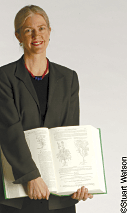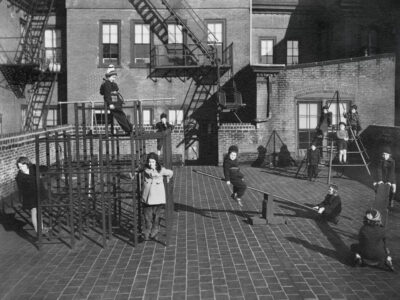
Interview | Dr. Rebecca Bushnell, a professor of English who has become the new dean of the School of Arts and Sciences, sat down with Gazette associate editor Susan Frith in January to talk about her new role, facilities for teaching and research, and some of the parallels between gardening and education.
In your last post, as dean of the College, you continued to teach. Do you think you’ll have time to do that as dean of SAS?
I hope so. Next year I hope to teach a seminar on tragedy for English majors. This is a course that will be related to a book I’m writing right now, called A Short Introduction to Tragedy. I think it’s important to continue to have contact with undergraduates, and [teaching] also helps remind me every day of what it means to be a faculty member at Penn.
Your last book, Green Desire: Imagining Early Modern English Gardens, focused on English gardening manuals of the 16th and 17th centuries. To stretch the metaphor a bit, can you look at how the garden of SAS is growing?
My interest in reading old garden manuals came out of my book on teaching and humanistic education, A Culture of Teaching: Early Modern Humanism in Theory and Practice. As I was reading early works on education I found that they compared education to gardening. The metaphor is very apt—it is cultivation, after all. What I learned from reading those gardening books was what those gardeners learned, which is that you work with and not against nature.
In cultivation, whether it has to do with a student or faculty or an intellectual field, you have to identify the strength and the will—the nature—of what you’re working with and do what you can to help it flower and grow and keep it strong.
It may be early, but can you identify areas in SAS where you’d like to see more growth?
Certainly we have always known that Arts and Sciences is distinctive in the number of our interdisciplinary programs and faculty. I know this is something that the president [Amy Gutmann] has identified as a priority for her administration. I have been speaking with my associate deans about pursuing new programs and opportunities for initiatives with other schools. This is an area where we definitely want to build on what is already a considerable strength.
Also, we are right in the middle of a curriculum review in the College. We have a tremendous opportunity to develop an exciting new undergraduate curriculum. As dean of SAS it’s my job to bring both the faculty and resources we need to make that curriculum work.
In previous years there has been a great focus on the undergraduate experience. I wonder if you could talk about plans for graduate education.
We are improving graduate stipends. But beyond paying attention to the financial support of the graduate student, we need to work with graduate groups on developing more imaginative approaches to how we deliver graduate education beyond the traditional format of graduate seminars, studying for exams, and writing a dissertation.
We want to give graduate groups a lot more freedom to find the best way to train graduate students for this century.
Can you comment on faculty-hiring trends for SAS?
It’s a bit premature. I’d like to sit down with groups of faculty and ask, “What are the emerging areas of knowledge in your field? What should the faculty look like 10 to 20 years from now? How can we make the strategic appointments in those disciplines so that 10 to 20 years from now we are going to be the leader in those fields?”
I think Penn has a great tradition of hiring really smart people on the tenure track, grooming them, and tenuring them. This is something some of our peer institutions don’t do. They tend only to hire at the top. I think we want a two-pronged strategy, which is to identify the stars in the making, but at the same time, to make some strategic appointments in places where we really want leadership now.
How do building improvements and new facilities fit into the plans?
This is an area where we have made a great deal of progress, and I have to thank [former Dean] Sam Preston and also Ramin Sedehi, who is our vice dean for finance and administration, who’s taken the lead on developing a facilities plan.
Phase One of our life sciences building is on track to be completed in the summer. Bennett Hall’s renovation is underway, and I think it will be a tremendous accomplishment to have renovated a building that has such historic importance on campus and also sees so much student traffic.
And the new McNeil Center for Early American Studies is going to be up soon.
We have a lot of challenges for the future, [such as] the second of the life sciences buildings, renovation of the McNeil Building [for Economics and Sociology], and we have to renovate our undergraduate laboratories as part of a broader plan of improvements in undergraduate science education.
We’re also going to be renovating the Music Building and we’re moving forward with the new Penn Information Commons. It’s a collaboration between SAS and the library to construct a facility on the first floor of Van Pelt, which will combine a technology-rich space for group study [with resources for] students working on undergraduate research and independent projects.
Say, for example, a professor assigns you an undergraduate research paper. You will be able to come to the common and meet with the reference librarian who can help you identify sources you need for this project; you might meet someone from the Communication Within the Curriculum program who can help you with the [oral] presentation of your project; you could visit the digital media center if you want to integrate new technologies in your project.
How about the recruitment and retention of women faculty in SAS?
I’ve come to understand over the years that I’ve been in the dean’s office just how important it is to create a critical mass both of female faculty and faculty in underrepresented minorities. It’s a way of increasing the pool of graduate and undergraduate students. They become role models while they shape the nature of our community.
From my [own] experience, I also know the challenges in recruiting and retaining women faculty. So I think I’m in a good position to understand what’s at stake for women in academia and also to respond to it.
Penn has been a terrifically supportive place for me as a woman and also as someone who had two kids while she was on the tenure track. I want to give similar support to our faculty—male and female.




